Living with Bone Cancer – Recovery and Support
Living with bone cancer involves not only physical recovery but also emotional and social adjustment. Whether you’re undergoing treatment or in remission, long-term care, support, and rehabilitation are essential to ensure a good quality of life.
1. Physical rehabilitation
- Post-surgery, patients often need physiotherapy to regain strength and movement.
- Those with limb-sparing surgery or amputations benefit from:
- Prosthetic training
- Balance and gait exercises
- Pain management
2. Emotional and psychological support
- The cancer journey can cause anxiety, depression, or trauma, particularly in young patients.
- Support groups, therapy, and mental health services help individuals and families cope.
- In SA, organisations like CANSA and CHOC Childhood Cancer Foundation offer support and counselling.
3. Education and social reintegration
- Children and teens may return to school with adapted schedules or assistance.
- Schools and employers can help with reasonable accommodations.
- Confidence-building and body image support are important after amputation or scarring.
4. Long-term monitoring
- Survivors need regular check-ups to:
- Monitor for recurrence or metastasis
- Manage long-term effects of chemo or radiation (e.g. heart, kidney function)
- Frequency of scans and blood tests varies by cancer type and stage.
5. Nutrition and lifestyle
- A healthy diet supports recovery and immunity.
- Avoiding tobacco, alcohol, and processed foods can help lower cancer recurrence risk.
6. Financial and practical challenges
- Treatment and travel costs can be burdensome, especially in rural South Africa.
- Public hospitals offer subsidised care, and organisations like PinkDrive provide transport and screening services.
7. Survivor outlook
- Five-year survival rates vary depending on:
- Cancer type and stage
- Access to early treatment
- Age and general health
Living with Bone Cancer
Many survivors of bone cancer go on to lead full, active lives, pursue careers, and start families. With continued support, education, and follow-up, bone cancer doesn’t have to be the end of your future — it can be the beginning of a new one.
👉 [End of Series | Back to Overview]


